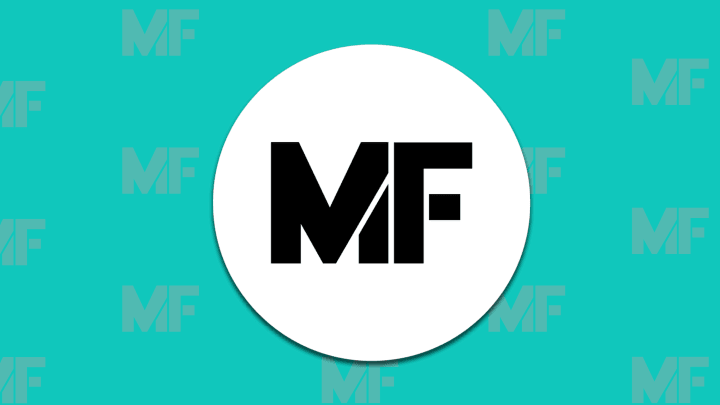12 Time-Bending Words from Back to the Future
By Angela Tung

Thirty years ago today, Back to the Future blasted into theaters, sending one Marty McFly back 30 years himself to 1955.
Not only does Marty have to make sure his parents get together, he has to fit in, which means wearing the right clothes, not knowing too much, and using the right lingo. He slips a couple of times—or does he? Find out in these 12 time-bending slang terms from Back to the Future.
1. HEAVY
“Whoa, this is heavy,” Marty says. “There's that word again,” responds Doc Brown. “Why are things so heavy in the future? Is there a problem with the Earth's gravitational pull?”
Actually, someone in 1955 probably would have known what heavy means. Way back in the first century, the word referred to something that was greatly important. While that became obsolete, heavy picked up again in 1930s jazz slang in reference to music that was profound or serious. Soon after, it gained its figurative meaning.
2. BUTTHEAD
Biff calls Marty a butthead in both 1955 and 1985. However, he would have never used the word in the 1950s.
Butthead didn’t originate until the 1980s. It might have come from butterhead, African-American slang for someone who’s a “disgrace to the community,” but that didn’t come about until the 1960s.
The word butthead reached peak-buttheadness in the early 1990s, most likely due to the TV show, Beavis and Butt-head, which debuted in 1993.
3. RERUN
While his 1955 family has no idea what Marty is talking about when he says he’s seen a Honeymooners episode “on a rerun,” rerun television shows actually already existed by then.
The word rerun originated in the early 1920s to mean a repeated attempt, especially a race or election. By the 1930s, it meant a second running of a motion picture, and by 1955, a rerun was a repeat of a television program, a practice that began that decade with shows like I Love Lucy, which were recorded rather than broadcast live.
4. JIGOWATT
“One point two one jigowatts!” Doc Brown says. “Great Scott!”
So what the hell’s a jigowatt? It’s been thought of as a mispronunciation of the hard-g gigawatt, or a billion watts. However, according to the National Institute of Standards and Technology, gigawatt can be pronounced with a soft G, as in gigantic (and perhaps GIF).
5. and 6. TAB and PEPSI FREE
“Gimme a Tab,” Marty tells Lou the diner owner. When that fails: “A Pepsi Free.”
“You wanna a Pepsi, pal,” Lou says, “you're gonna pay for it.”
The 1955 town residents definitely wouldn't have known about Tab or Pepsi Free. Tab, one of the earliest diet sodas, was introduced in 1963 by the Coca-Cola Company and was advertised for those who wanted to “keep ‘tabs’ on their weight.” Caffeine-free Pepsi Free came onto the market in 1982.
For much of the ‘80s, Michael J. Fox was a Pepsi spokesman, as evidenced by the plethora of Pepsi product placement in the Back to the Future franchise.
7. SLACKER
Slacker is Principal Strickland’s favorite putdown for both Marty and his dad. While this term might seem to epitomize the '90s, it actually originated almost 100 years earlier to mean someone who shirks responsibility. Slacker peaked in popularity around World War I when it referred to a military draft dodger.
From there the word's usage dropped dramatically, only getting a slight bump in the '90s with the release of the film of the same name. By about 1994, slacker came to refer to an entire generation characterized by apathy and lack of ambition, also known as Generation X.
8. DREAMBOAT
“Isn't he a dreamboat?” Lorraine says of Marty. A cute guy in the 1950s would have definitely been called a dreamboat. The term originated in the early '40s, probably from the 1936 Guy Lombardo song, "When My Dreamboat Comes Home."
9. DADDY-O
Daddy-o is a slang term Marty gets right. It originated around 1949 as part of bop talk, or lingo associated with bebop jazz. Other examples of bop talk include crazy meaning “wildly exciting”; cool, “tasty, pretty”; flip, “to react enthusiastically,” and dig—ya dig?
10. PARK
"Do you mind if we park for a while?" Marty asks Lorraine. Marty gets it right again. The term for getting hot and heavy in a parked car is from 1947.
11. SQUARE
“Don’t be such a square,” Marty’s mother tells him. A well-known 1950s slang term, square, or old-fashioned, emerged from 1940s jazz lingo. It might be named for the square shape a conductor’s hands make for a basic four-beat rhythm.
Another “square” term with almost the same meaning originated 200 years earlier: square-toes refers to someone who is overly formal and precise, and is named for a men’s shoe style that had gone out of fashion.
12. SKATEBOARD
“What's that thing he's on?” a girl asks as Marty zips away from Biff and his goons. “It's a board with wheels!” a boy says.
It is indeed true that 1950s middle America wouldn't have known what a skateboard was. While a WAC stationed in 1940s France witnessed children in Paris riding boards with roller skates, and surfers in the '50s “sidewalk surfed” when waves were bad, skateboarding didn’t hit mainstream America until the 1960s.